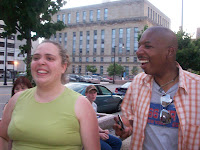At this point we have established the fact of the problem, and the nature of the problem. Here we come to the substance of Jesus life and teaching as a response to the problem. We read throughout the gospels:
"Jesus went into Galilee, proclaiming the good news of God. 'The time has come,' he said. 'The kingdom of God is near. Repent and believe the good news!'"
"From that time on Jesus began to preach, 'Repent, for the kingdom of heaven is near.'"
Which begs the question...
=================================
What is the Kingdom of the Heavens (God)?
The Psalmist writes, "the highest heavens belong to the LORD, but the earth he has given to man."
The Kingdom of God, simply put, is wherever God is King; there is a realm where whatever God desires to happen, actually happens, this realm is called 'heaven' or God's 'Kingdom.' There is a realm where God has set aside His dominion and placed authority into the hands of human beings, this is the realm of the earth.
The earth is sustained and exists by virtue of God's will, however, human beings were given control over what God had made. We have seen elsewhere that man has excluded God's direction from the realm of human activity and this is the cause of the problem.
=================================
Two Kingdoms
God has always intended for mankind to have their own authority! In the beginning God gave humanity dominion of the earth, it was to be our role to exercise concern and authority over the world; to protect and create, to cultivate and care.
Just like the ultimate goal of all healthy parenting is children who become parents, so God wanted to give power into the hands of human beings. Like adult children who love and obey their parents, and parents who love their adult children and respect them as fully capable and mature human beings; so God wants to see us mature and align ourselves of our own free will with His power and authority!
Of course we have worked towards two kingdoms in a very different way! We have rebelled! Like a child stealing the car out of his parents drive-way that was intended for them on their 16th birthday, we have taken by violence that which was ours by birthright!
We have worked toward a human kingdom that was autonomous but in rebellion, as opposed to reaching autonomy through maturity. God always wanted us to have our own dominion, but not the way we have made it...
=================================
You must have often wondered why the Enemy does not make more use of His power to be sensibly present to human souls in any degree He chooses and at any moment. But you now see that the Irresistible and the Indisputable are the two weapons which the very nature of His scheme forbids Him to use. Merely to over-ride a human will (as His felt presence in any but the faintest and most mitigated degree would certainly do) would be for Him useless. He cannot ravish. He can only woo. For His ignoble idea is to eat the cake and have it; the creatures are to be one with Him, but yet themselves; merely to cancel them, or assimilate them, will not serve.
God is wanting to have a relationship with His children, but a relationship of mutual affection, and mutual engagement. God wants to share life with us!
Just like a mother wants her children to do good, not merely out of obedience, but out of the depths of their character, so God wants us to submit our will to His, not merely to 'do what He says,' but to will it! Phillipians 2:13
=================================
The Invitation to the Kingdom
When Jesus arrived on the scene preaching a message of God's Kingdom coming, what He was essentially saying was, "God is bringing His rule, and His reign; God is going to put everything back together the right way!"
This is Jesus invitation to allow God to become our king. We are invited to partner with God; to allow the Kingdom of God to merge with the Kingdom of Man; to allow the dictates of heaven to direct life on earth; to cooperate with God.
In a very real sense, we are not having our will overrun by the will of God; it is not one kingdom taking another over by force. Instead we are submitting, choosing God's will over our own; it is more like a nation petitioning for entrance into the E. U.
This is God's plan for putting the world right: inviting individual women and men to become disciples within His Kingdom; willing subjects who want to put God's good authority into effect in every aspect of their being.
It is this willing cooperation with the Spirit of God that works for the effective renovation of our hearts, and the subsequent transformation of our world.
=================================
With these concepts and observations under our belt, we turn to approach the teaching of Jesus called 'the Sermon on the Mount.'

























